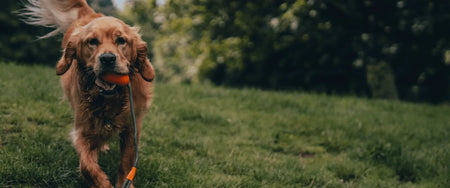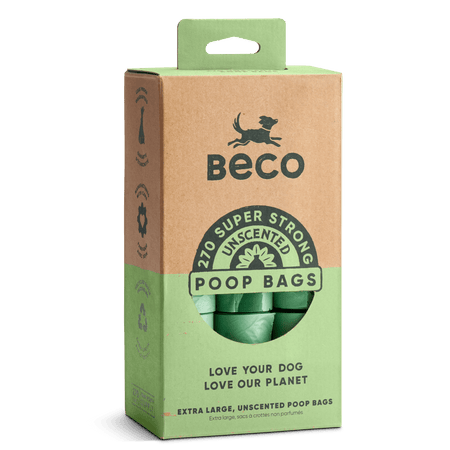As much as we all love our dogs – and those long walks through parks, fields, and trails – there's one bit we could do without: the poop.
For those who always pick up after their dog, thank you. You go a long way to protecting public health while keeping our parks, pavements, and paths clean.
But once you’ve scooped it up, the next step isn’t always so obvious. Where should it go? What’s best for your dog, your bin, and the environment?
That’s what we’re here to unpack.
- UK law requires dog poop disposal in general waste bins only.
- Home composting requires dedicated systems with 60°C temperatures for safety.
- Biodegradable bags don't break down in UK landfills without oxygen, so recycled plastic bags work best with existing waste infrastructure.
- Flushing, burning, or shallow burial are illegal or unsafe disposal methods.
What Does the Law Say About Dog Poo in the UK?
Under the Dogs (Fouling of Land) Act 1996, dog owners have a legal obligation to pick up their dog’s poo in public spaces.
Many councils have introduced Public Space Protection Orders making it mandatory to carry dog poo bags on every walk (or face a fine of up to £100). Failure to clean up can lead to prosecution and a £1,000 penalty.
You must dispose of dog waste in a general waste bin (usually black or grey). This applies both at home and when out in public. Special dog waste bins are handy but not required – ordinary litter bins are legally acceptable.
However, food, garden, and recycling bins are strictly off-limits for dog poo. Doing so risks contamination and can cause serious hygiene and pest issues.
Don't Forget Your Dog Poo Bags
Before stepping out with your dog, make sure you’re equipped: lead, treats, ball – and of course, dog poop bags.
Without them, you could end up in a sticky situation and a legal one too.
Compostable poop bags are a great choice if you have a garden compost system at home. They’re sturdy, practical, and break down in well-managed piles.
But if composting isn’t on the cards, recycled plastic bags may be the more responsible option.

Composting Dog Poop at Home
Composting dog waste can be an effective way to reduce your environmental impact, but it needs to be done carefully.
Why? Because dog poo contains parasites like Toxocara and pathogens like E. coli that can pose serious risks if not neutralised properly.
Here’s how to compost safely:
-
Use a dedicated compost bin – not your regular garden compost.
-
Maintain internal temperatures of at least 60°C for several days.
-
Mix in carbon-rich materials (sawdust, newspaper, leaves) at a 2:1 carbon:nitrogen ratio.
-
Keep it aerated and moist, and let it cure for several months.
-
Use the compost only for non-edible plants and landscaping.
Compostable poop bags made from materials like cornstarch will break down under these conditions, unlike traditional or even biodegradable plastic bags.
Waste Digesters and Worm Farms
If you’ve got a bit of garden space, a waste digester might be the most hands-off, low-waste option available.
Think of it as a septic tank for your dog. Enzymes and water help break down the waste underground – no bags needed.
Worm farms, while less common, are also gaining popularity. Worms can break down organic material (including dog poo) when managed correctly. You’ll need to add high-carbon material and keep it separate from kitchen scraps.
Again, the resulting compost is for non-edible plants only.
What About the Bin?
Most UK councils recommend disposing of bagged dog poo in your general household waste bin. Double bagging is encouraged to reduce odours and leaks.
These bins usually go to landfill or incineration – neither are perfect, but both are controlled systems designed to handle offensive waste.
In public spaces, you can use any general litter bin or a dedicated dog waste bin if one is available. If neither are nearby, take it home.
Avoid:
-
Garden waste bins
-
Food waste bins
-
Recycling bins
These aren't suitable due to contamination risks and public health regulations.
Why Not Biodegradable Bags?
The term biodegradable sounds green, but it’s not always what it seems.
Most biodegradable bags require oxygen to break down, and UK landfills are anaerobic (lack oxygen). In other words, they just sit there.
Biodegradable bags in landfills can even release methane, a potent greenhouse gas.
So if you’re binning dog poo, recycled plastic bags are the smarter choice. They use 86% less carbon than virgin plastic and work within the waste systems that already exist.
Flushing, Burning, Burying: What Not to Do
Flushing dog poo down the toilet isn’t legal in the UK and is strongly discouraged by water companies. The risk to water supplies, treatment systems, and aquatic ecosystems is too high.
Burning is even worse. It’s classified as a statutory nuisance, producing smoke and odours that are harmful to neighbours, pets, and air quality.
Shallow burial is also not recommended. Dog waste can leach into the soil and contaminate water sources unless buried very deep (2 feet minimum) which makes it impractical and still risky.
How Beco’s Bags Help You Make Better Choices
At Beco, we don’t believe in empty green claims. That’s why we use post-consumer recycled plastic for our bags.
Why?
-
It keeps plastic out of oceans and landfills
-
It works with the UK’s current waste systems – no special composting needed
-
It’s strong, reliable, and leak-resistant for daily walks
Frequently Asked Questions
Can I use dog poo in a wormery with other kitchen waste?
No, it’s not recommended. Dog waste should be kept separate due to the risk of harmful pathogens, which can compromise the safety of vermicompost used in gardens.
Is there a difference between compostable and biodegradable bags?
Yes. Compostable bags are designed to break down into organic matter under specific conditions, while biodegradable bags may only fragment without fully decomposing, especially in a landfill.
Do dog poo bags expire or go 'off'?
Compostable bags can degrade over time, especially if stored in humid or warm conditions. Always check the packaging for best-before dates and store them in a cool, dry place.
What should I do with dog poo if I’m camping or off-grid?
You should bag it and pack it out with your rubbish unless there’s a designated disposal system. Avoid burying it, as it can contaminate soil and water sources.
Conclusion
Dealing with dog poo at home isn’t exactly fun, but it’s part of having a dog.
Whether you’re binning it, composting it, or using a digester, the goal’s the same: get rid of it safely, legally, and with as little impact as possible.
Composting works if you’ve got the setup. But for most people, the bin’s where it ends up – and that’s where recycled plastic bags come into their own. They’re strong, reliable, and don’t rely on perfect conditions to do their job. Plus, they give existing plastic a second life instead of sending new plastic into the system.
Our bags are made for real-life routines, built to hold up, made with care, and designed to work with the waste systems we’ve got. Shop now!










